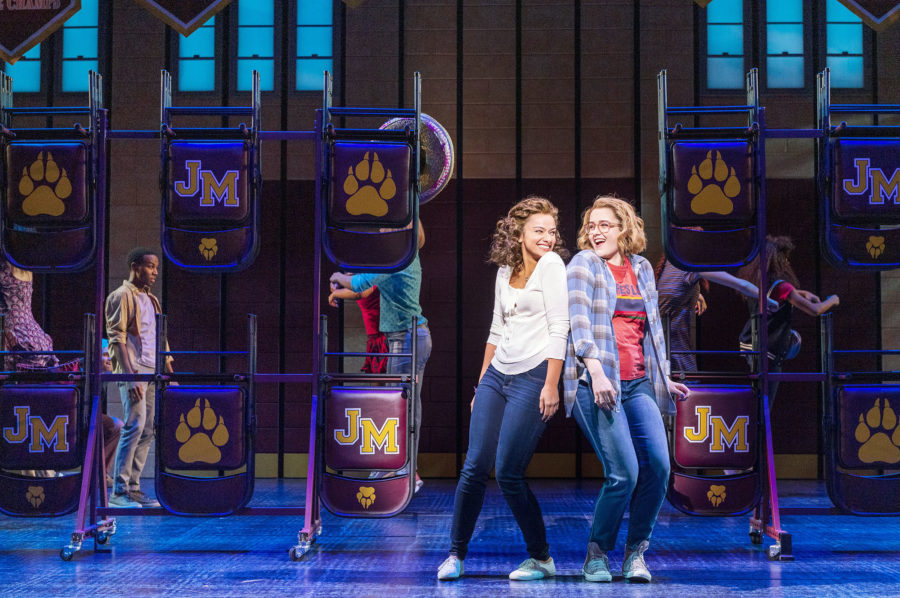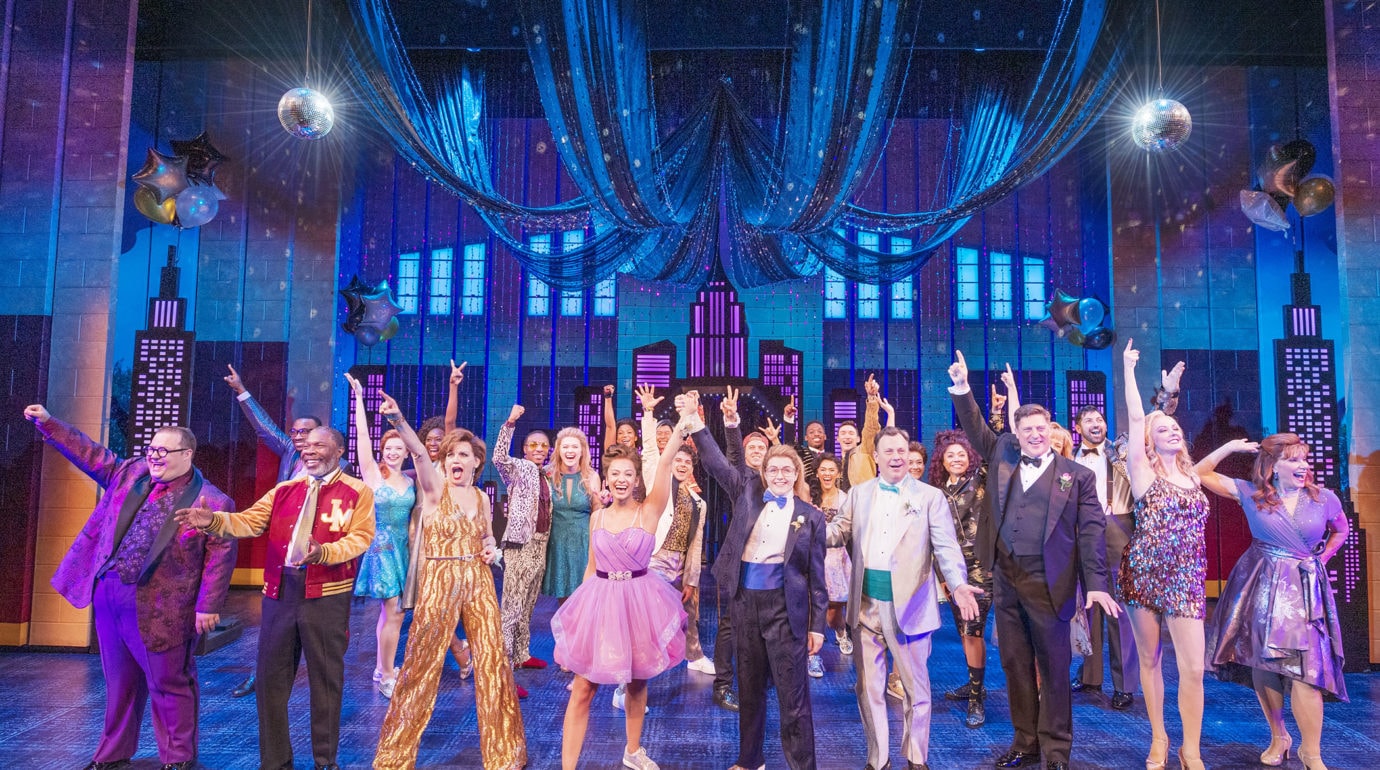Spoiler alert! This article reveals some key plot points from The Prom.
It was curtain call. I leapt to my feet, tears in my eyes, hooting from the balcony as faux-teens in sequined frocks bopped below me.
I expected to enjoy The Prom, the new Broadway musical about a shy Indiana teen who just wants to take her girl to the big dance, leading to the event being cancelled, and the New York actors who take up her cause in the name of positive PR.
The show promised to check off all of my personal boxes. Besides working as a theatre critic and performer, I write young adult fiction. I own two prom dresses my friends wore in the late’90’s and early aughts. And I wear them.
Did I mention I’m bisexual and hail from a small town in the Midwest?
Still, I didn’t expect to cry at The Prom. And when the two female leads kissed on live TV a few weeks later (a Macy’s Thanksgiving Day Parade first), I cried even harder.
I didn’t come out until my 30s. I’m not sure how conscious I was of my sexuality when I was the same age as Emma (Caitlin Kinnunen) and her closeted girlfriend Alyssa (Isabelle McCalla). I went to three proms with the same guy, no drama.
I’m aware of my privilege. I still mostly date cis men. My style is very femme but I can and often do “pass” as straight. And yet despite all of the above, The Prom affected me on a very deep level (I now keep my Playbill in a special pink-striped box). Here’s why.
Positive representation (with zazz)
There aren’t a lot of queer girls on Broadway. Fun Home made a big splash when it won best musical at the Tony Awards, and Indecent by Paula Vogel was a long-awaited Main Stem debut for the notably lesbian playwright. But who says we should only get two? Moreover, rather than concentrate on trauma, The Prom has a young woman engaged in the eternal teenage struggle: finding a date to the prom. Except in Emma’s case, because she wants to take her girlfriend, she is bullied and her family throws her out (something that is still unfortunately normal for many LGBTQ youths around the country).
Eventually, Emma finds solidarity and support among theatre people. Openly gay Barry Glickman (the forever-delightful Brooks Ashmanskas) helps her pick out a killer prom outfit. Perpetual chorus girl Angie Dickinson (Angie Schworer) encourages Emma to come forth with Fosse-esque attitude, a.k.a. “zazz.” By the end of The Prom, Emma has owned her power and her voice.
There’s an Emma in every queer woman. We want to be seen, in a culture where lesbian, bi, and pan women are still presented as jokes, cautionary tales, or worst, erased entirely from the pop-culture narrative. The Prom shows that our lives aren’t just defined by tragedy; there’s joy and laughter too. Queer women have always existed, and thanks to musicals like The Prom—and now the upcoming reboot of “The L Word”—we’re getting more positive pop-culture representation than ever.
Growing up in community theatre, I was friends with queer people long before I realized I was one. I admired the colorful ensembles, big voices, and take-no-prisoners attitudes of the adult actors who played my parents or fellow chorus members. Like Emma’s Broadway friends, these artists became my mentors. As I grew older, I found myself emulating what I now know as “zazz”: living life on your own terms, while striking a pose.

The Midwest: We’re not all animals!
As a lifelong Midwesterner, I see the region as a complex but beloved family member—I can make fun of them, while you, if you’re from outside the area, cannot. I shudder at ads for “Ozark,” because I grew up a few hours away from that area, and I know that not every Missouri resident is money-laundering, ultraviolent trash.
I deeply appreciated The Prom’s nuanced setting. Yes, most of us move away from our hometowns to escape bigotry, lack of diversity, and MAGAites. And it’s present here: Emma’s schoolmates leave a teddy bear with a noose in her locker.
But there’s support too. Emma’s grandmother takes her in after her parents throw her out. Principal Hawkins (Michael Potts) goes to the state’s attorney on Emma’s behalf and argues for her right to attend prom with whomever she pleases.
Small-town folk can be awful—a common refrain among my Catholic school classmates was “God made Adam for Eve, not Steve”—but many are willing to learn, and The Prom’s authentic portrayal warmed the part of me that will always feel at home in a pickup truck.
It’s worth noting that the majority of Broadway audiences are non-New Yorkers. Many, in fact, are tourists from the Midwest. By setting The Prom in one of the largest stages in America, folks from my former neck of the woods can see themselves and learn how to love their neighbors.
A happy ending, complete with kiss
More than anything else, Emma’s journey from outcast to celebrant is a long awaited coming-of-age tale for women like me. “I just wanna dance with you,” she sings to Alyssa, and by the end she gets the simple wish the world insists on complicating. The battle is far from over—at the time of publication, gay actor Jussie Smollett was attacked last week in Chicago. With an openly homophobic vice president who endorses conversion therapy, many have a long way to go before they feel completely safe. Even the kiss on television between Emma and Alyssa was criticized by conservative organizations for being a bad influence on children.
But through Emma, queer girls can learn that they too can have a happily-ever-after. By the end of The Prom, she’s sung her feelings publicly and found a community of like-minded souls. Her girlfriend finally stood up and came out. Emma’s the hit of an all-inclusive prom, sporting a fierce tux. Yes, Emma has taught the people around her important lessons about love and acceptance, but she also became more sure of herself in the process. The Prom is her story, complete with a kiss.
And as I danced along with the joyful finale, I realized that I’d needed Emma’s happy ending for myself. Even as a privileged queer woman, the world is not a fun place to be right now. For every rainbow flag and forthcoming lesbian holiday romcom, there’s a horrifying news story that reminds me we’re so far from where we need to be. Both thoughtful in its execution and positive in its depiction of romance, acceptance and sparkly shoes (because I’m not only queer, I’m high femme), The Prom instilled in me something I didn’t realize I needed—hope.
Let’s dance.
Lauren Emily Whalen is a 2018 alum of the National Critics Institute at the Eugene O’Neill Theater Center, an Equity Membership Candidate, and author of the YA novel Satellite. She lives in Chicago and will happily accept ’90’s prom dresses to add to her collection. Find her on Twitter and Instagram.




